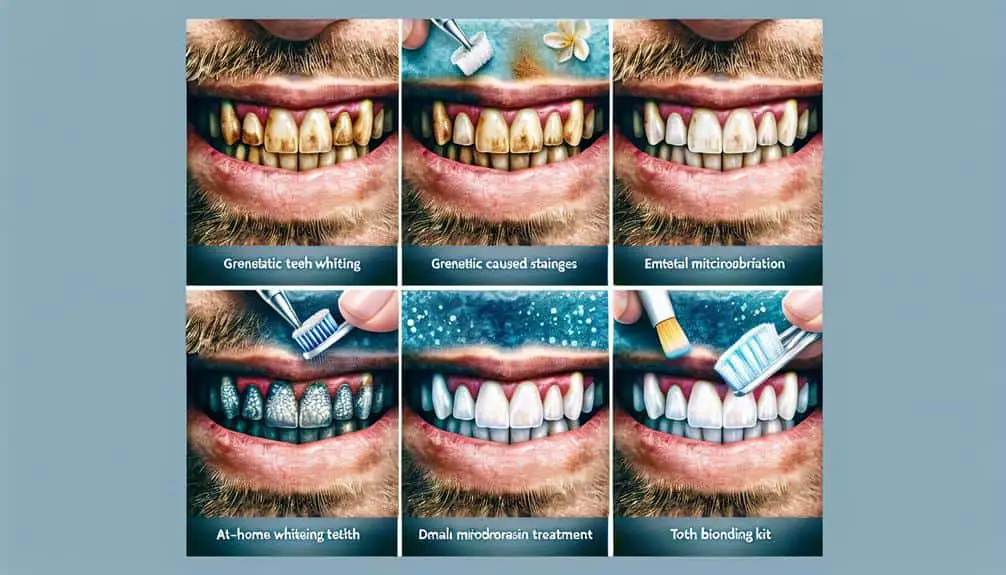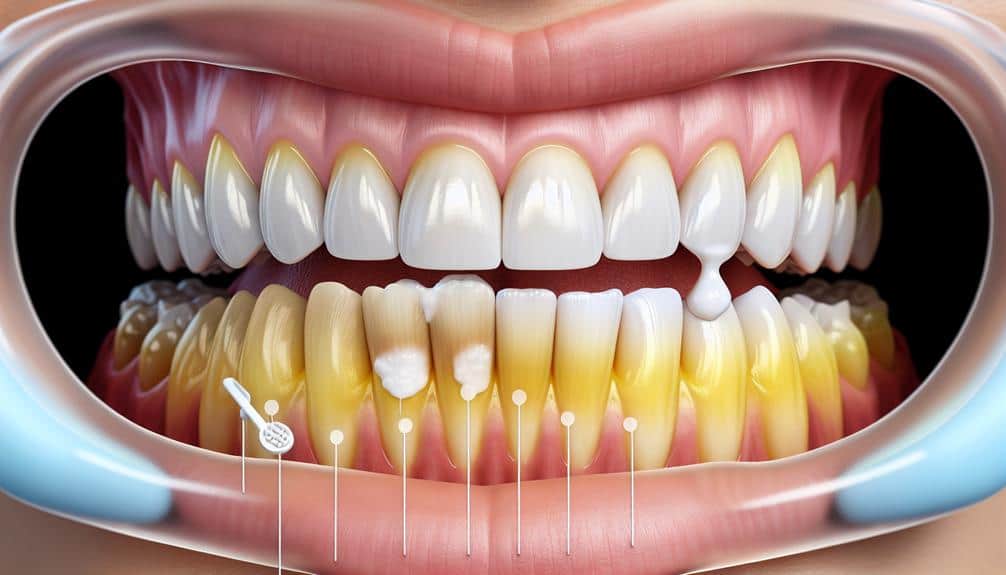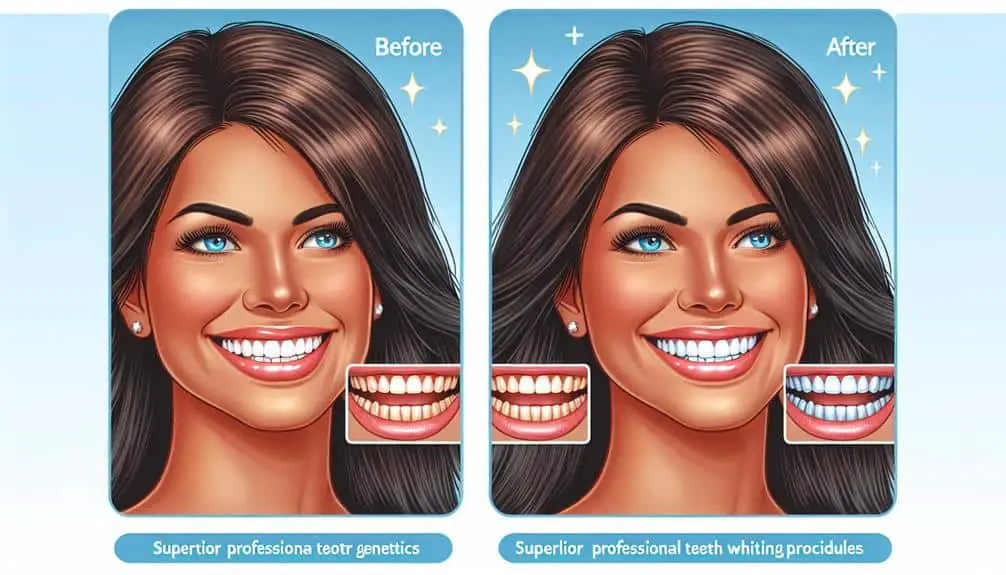If you're battling genetic tooth stains, here are the top 5 solutions. Consider your enamel thickness, opt for professional whitening treatments for fast results, try at-home remedies like oil pulling, think about dental veneers for a lasting fix, and stick to long-term maintenance habits. These strategies address genetic predispositions affecting tooth discoloration effectively.
Key Points
- Consider professional whitening treatments for effective and lasting results.
- Consult a dentist before trying at-home whitening solutions.
- Opt for dental veneers for a durable and stain-resistant solution.
- Maintain oral hygiene to prevent plaque buildup and discoloration.
- Limit consumption of staining foods and drinks to preserve tooth color.
Understanding Genetic Tooth Stains
Have you ever wondered why some individuals are more prone to genetic tooth stains than others? Genetic factors play a significant role in determining the susceptibility to tooth discoloration. Inherited traits such as the importance of the enamel, the natural color of the teeth, and the composition of dentin can all contribute to the likelihood of developing genetic tooth stains.
Enamel thickness, which is genetically determined, plays a vital role in how easily teeth become stained. Thinner enamel allows the underlying dentin to show through, making the teeth appear more yellow or discolored. Additionally, the natural color of your teeth, which is also inherited, can influence how noticeable stains are. Some individuals naturally have teeth that are more prone to yellowing or discoloration due to genetic predispositions.
Understanding these genetic factors can help you make informed decisions when it comes to preventing and treating genetic tooth stains. While genetic predispositions may make you more susceptible to discoloration, there are various solutions available to help you achieve a brighter, whiter smile.
Professional Whitening Treatments
Professional whitening treatments offer a highly effective solution for addressing genetic tooth stains and achieving a brighter, whiter smile. These treatments are usually performed in a dental office by a trained professional, ensuring safe and efficient results. Alternative options such as over-the-counter whitening products may not provide the same level of effectiveness as professional treatments due to differences in concentration and application methods.
When considering professional whitening treatments, it's essential to understand the cost comparisons. The price of these treatments can vary depending on the method used, the number of sessions required, and the dental clinic's location. In general, professional whitening treatments may be more expensive than at-home alternatives but often deliver quicker and more noticeable results. Additionally, the expertise of a dental professional can help minimize the risk of side effects such as tooth sensitivity that may occur with other whitening methods. Overall, professional whitening treatments are a reliable choice for individuals seeking significant and lasting improvements in tooth color.
At-Home Whitening Solutions
To guarantee your journey towards brighter teeth and addressing genetic tooth stains, exploring at-home whitening solutions can offer convenience and flexibility in maintaining your smile. DIY remedies using natural ingredients can be effective in tackling genetic tooth stains.
One popular method is creating a paste using baking soda and hydrogen peroxide. The abrasiveness of baking soda combined with the whitening properties of hydrogen peroxide can help remove surface stains on your teeth.
Another natural option is oil pulling with coconut oil, which involves swishing coconut oil in your mouth for about 15-20 minutes to reduce bacteria and promote whiter teeth.
Additionally, you can try using activated charcoal to whiten your teeth at home. Activated charcoal is known for its adsorptive properties, which can help remove stains from the surface of your teeth when used in moderation.
Remember to always consult with your dentist before trying any at-home whitening remedies to make sure they're safe for your teeth and gums.
Dental Veneers for Discoloration
Consider dental veneers as a long-lasting solution for addressing discoloration concerns and enhancing the appearance of your teeth. Dental veneers are thin shells made from porcelain or composite resin that are custom-designed to cover the front surface of your teeth. They effectively hide discolorations, cracks, or other imperfections, providing you with a bright and uniform smile.
When exploring veneer alternatives, you may come across options like bonding or crowns. While bonding is less expensive, it isn't as durable as veneers and may need more frequent repairs or replacements. Crowns, on the other hand, cover the entire tooth and are typically used for more severe cases of discoloration or damage.
In terms of cost comparison, dental veneers are a long-term investment. The initial cost may be higher compared to other solutions, but their durability and resistance to staining can make them more cost-effective over time. Additionally, veneers are customizable to match your natural teeth, providing a seamless and natural-looking result.
Long-Term Maintenance Tips
When maintaining your dental veneers for discoloration, implementing long-term care practices is essential to preserving their appearance and durability. Proper oral hygiene and dietary habits play a vital role in ensuring the longevity of your veneers.
Here are some tips to help you maintain your veneers effectively:
- Brush and floss regularly: Consistent oral hygiene practices are critical to prevent plaque buildup and staining around your veneers.
- Use a non-abrasive toothpaste: Abrasive toothpaste can scratch the surface of your veneers, leading to discoloration over time.
- Avoid staining foods and drinks: Limit your consumption of coffee, tea, red wine, and other foods and beverages known to stain teeth.
- Visit your dentist regularly: Regular check-ups and cleanings can help detect any issues with your veneers early on and prevent further damage.
- Consider a mouthguard: If you grind your teeth at night, wearing a mouthguard can protect your veneers from wear and tear.
Frequently Asked Questions
Are Genetic Tooth Stains More Difficult to Treat Than Stains Caused by External Factors Like Coffee or Smoking?
Treating genetic tooth stains can be more challenging than those caused by external factors. While options exist, such as professional whitening or veneers, effectiveness may vary. Genetic factors can play a role in treatment outcomes, requiring personalized approaches.
Can Children Inherit Genetic Tooth Stains From Their Parents?
Like a genetic blueprint, dental health can be influenced by genetics. Children can inherit tooth discoloration from their parents due to genetic factors. Understanding this inheritance pattern can guide effective preventative dental care strategies.
Are There Any Specific Dietary Changes That Can Help Prevent Genetic Tooth Stains From Worsening?
To prevent genetic tooth stains from worsening, focus on dietary recommendations. Limit sugary foods and drinks, and increase intake of crunchy fruits and vegetables. These lifestyle changes can help maintain healthy teeth and prevent further discoloration.
Are Genetic Tooth Stains More Common in Certain Populations or Ethnic Groups?
Genetic tooth stains show varying prevalence among populations. Prevalence statistics highlight disparities, with some ethnic groups exhibiting higher rates. Cultural implications play a role, influencing both prevalence and perception of genetic tooth stains.
Can Genetic Tooth Stains Be a Sign of Underlying Health Issues?
Genetic tooth stains can indeed be a sign of underlying health issues. Your dental health is closely linked to genetics. Regular dental check-ups, proper oral hygiene, and understanding your genetic predispositions can help maintain peak oral health.



